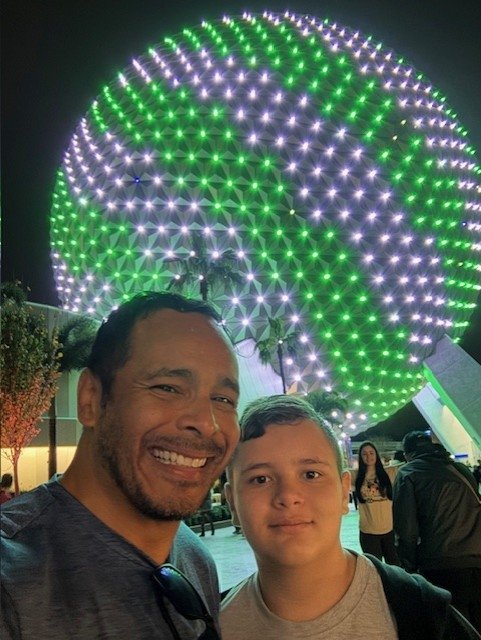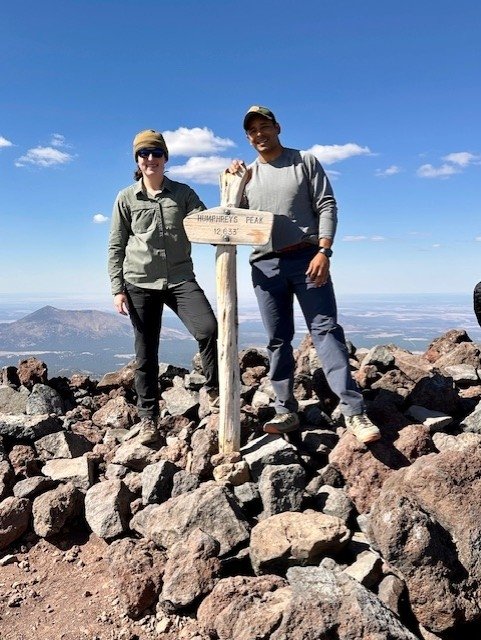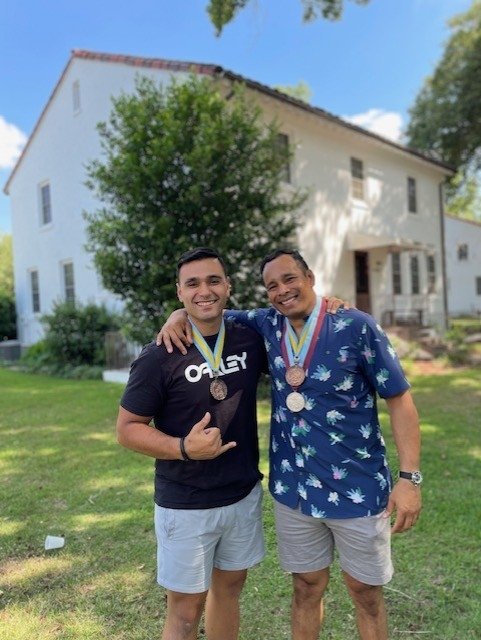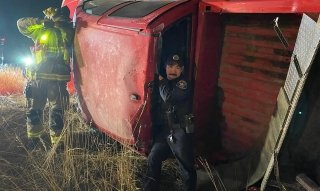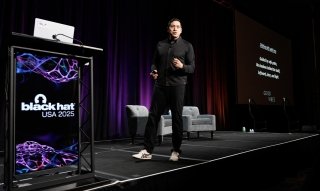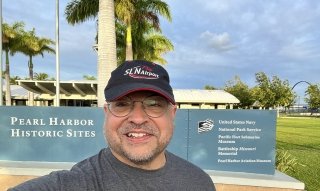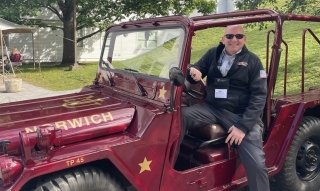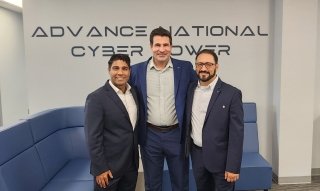Enrique G. Zelaya
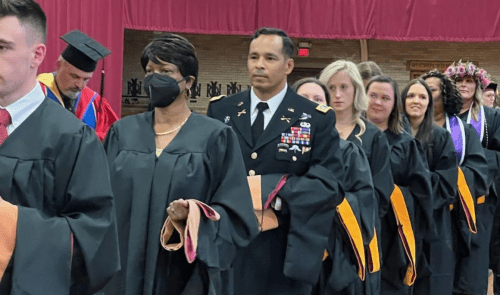
The master’s program could have just been a piece of paper, but Norwich gave me more, and they made me a better person.
****The following comments are the views of MAJ Enrique G. Zelaya and do not represent those of the U.S. Army Special Operations Command, the Army, or the Department of Defense. ***
Tell us about your military background and how that led you to pursue a Master of Science in Leadership online at Norwich.
Before I joined the military, I was a manager at Texas Roadhouse. I felt that I needed some purpose and ended up meeting with an Army National Guard recruiter. They offered me Special Forces or Officer Candidate School contract but I wanted to experience the military before making that big of a leap. I joined as a 19K, an M1 Armor Crewmember (tanker), and after about a year, I was stationed in Germany. Soon after, I underwent Special Forces selection, and after passing selection and the qualification course, I graduated as a Special Forces Medical Sergeant. I spent the next few years deploying multiple times to Afghanistan and one deployment to El Salvador.
I felt a calling to become a commission officer. I wanted to do this essentially to “have a seat at the table.” It is possible to make positive changes as an enlisted non-commissioned officer, but it requires several more years, and I wanted to begin making changes now.
I started my officer path in a Long-Range Surveillance (LRS) unit at Fort Cavasos (Hood). Later, I returned to the Special Forces Qualification course and graduated as a qualified Special Forces officer.
From there, I went on several more deployments, including a rotation to Afghanistan and a particularly memorable one in Panama. In Panama, I was able to work with their border and maritime security forces to enhance relationships and build partner nation capacity to counter threats in the region.
It was a phenomenal experience, and I would love to return.
When I was a new Captain, I realized that everyone says, “You have to be a good leader and be good to your people.” I asked myself what that really meant.
The Army talks a lot about leadership, and there is an established doctrine on how the Army defines leadership, but I wanted to learn more about the application of leading an organization. I had the “what”; I wanted the “how”. How do I become better as a leader?
I started researching and came across Norwich. I was looking for a program that would help me improve my communication and provide the best practices to direct and influence others. After looking into it, I spoke with a friend who attended Norwich, who recommended it highly. I had always wanted to attend a senior military institution but had never had the chance.
I looked into what was offered and found the military leadership program. I decided to focus on organizational leadership because I knew that was my next step in the military.
Now that you have completed your master’s degree, do you have a future education goal?
I am focusing on a Master's in Operational Studies with a concentration in Strategic Studies at the Western Hemisphere Institute of Security Cooperation (WHINSEC). It dives into the professional military education program that develops leadership skills and operational knowledge and challenges you to think. The program provides the opportunity to work with international partners from our Western Hemisphere. What I have learned is that you need to understand the National Defense Strategy and how you fit into the bigger picture for each region you operate in. You also need to know if there's an ambassador in that country and what the country’s strategy is. An officer is essentially an international businessman, just in the military.
Ultimately, I may pursue a Ph.D. in leadership because I feel that calling. I want to provide leadership and mentorship to everyone else who needs it.
Norwich is known as a challenging institution. How did you balance your military responsibilities, your family life, and Norwich's course load?
You need to be intentional in your goals. This means looking at weaknesses you may have and identifying ways to mitigate them. It is very similar to identifying risk in the military. The biggest challenge I undertook was time management.
I'm not just a student but also a leader within an organization, a dad, and a boyfriend. I needed to balance all of that. I started building a schedule. I asked myself, “When can I study? When am I going to be at work? When am I going to be in class?”
I planned to be home by 6:00 every night, so I was intentional with work and left no later than 5:30. I spent 6:00 to 7:00 decompressing from the day and then began my studies. I set aside Wednesdays and Saturdays to go to jiu-jitsu. I am an avid practitioner of jiu-jitsu, and it helps me have my “woosah” movements. I also planned out times to call my son and spend time with my girlfriend. Sundays were my reset day. Once I had the schedule built, I stuck with it.
Were there any courses that specifically impacted your leadership development?
The Fundamentals of Leadership class and Kotter's Leading Change. I will never forget the first video I watched in Fundamentals of Leadership. It reframed how I describe leadership. Now, I tell people that leadership is not a position, title, or anything that's going to put you on a pedestal. Rather, it's the way to win people's hearts and minds.
It even changed the way I introduced myself. I don't say, “Hello, I'm Major Zelaya”; I say, “Hello, I’m Enrique.” Because I'm a person, not a title. It’s also important to ask yourself how you are as a parent. How are you as a friend? How are you interacting with people in general?
The class tied the fundamentals into values well and that was a perspective I previously hadn’t thought about. That's when I really got into the class. I started to write down what I actually valued. For me, it was trust, family, integrity, respect, and service to others.
In the second half of my degree program, I took Kotter’s Leading Change. Organizational leadership is difficult, and Kotter provides a baseline. A leader needs to be able to communicate the future of an organization which is to provide end states. A leader can manage intent within an organization by providing purpose and direction and painting a picture of what they want the organization to be at the end.
These two classes, I will constantly go back to because, one, fundamental leadership is based on your values, and then, two, you need to understand how you are going to influence the organization, and it starts with the leader and how they see the future organization.
How has your Norwich degree opened new opportunities or influenced your career?
I became more open-minded. I realized that you have to listen to people when it comes to organizational leadership.
When I finished my master's, I was a full-time instructor at the Maneuver Center of Excellence in the Captain’s Career Course. I had brand new leaders, and they had ideas, and those ideas made sense. Part of leadership is influencing others, and I did that by empowering them. We tried their ideas, and they began to buy in. I was buying into their ideas, and they bought into mine, and we became a cohesive team. From there it grew into mentorship as more and more students came to me to ask for advice.

Our class mantra is “be a master of chaos because the world is chaos.” And to remember, as a leader, you are not on an island. Many times, people think that they're stuck alone with all of their problems, but they're not. You have people you can pick up the phone and call. Learning to do that, and having people reach back out to me for help is phenomenal.
My education and opening of my mind tie into my growth as a person. As a person, I grew to better understand my son to be a better dad and to be a better boyfriend.
I stopped seeking positions and began to seek what I could do to help the organization I was in.
What advice would you give to someone who's considering Norwich for an education in leadership?
Reach out to talk to people like me who've done it before. Don't be afraid.
Norwich did that for me. I remember they provided a number of a military mentor to provide me a better connection to the program and the school.
I took that advice, and it helped me to be certain about my decision [to attend Norwich]. One of the things they shared that stuck with me is when they explained that I would grow to have more than a military mindset. I was going to be with people from all walks of life. In my program, I had CEOs, people working at embassies, service members, and people who just wanted to improve themselves.
If you want to go to an online school that provides you with flexibility and a broader view of leadership and its application, Norwich is the way to go, hands down. It has a reputation as a senior military college but also as a college that looks at people as people, not numbers.
Did you build any lasting connections with your classmates or faculty?
Yes, Scott Wills, the director of leadership programs, and I still speak quite often. I would happily come to Norwich as a leadership presenter for him. Many of the other students in my classes are on a group text that is still active. We all have something in common: we have the same kind of problems. Trying to manage life, time to study, and everything else. We help each other out and work together. One of the things that made me want to stay in the program was knowing I wasn’t alone.
What was the most rewarding part of completing the leadership program?
The most rewarding part was the personal growth I received from it. The master’s program could have just been a piece of paper, but Norwich gave me more, and they made me a better person. I improved professionally, as a dad, and as a person who saw things and looked at things differently. I take the things I learned in this program and apply them to the people I lead daily.
Describe Norwich's leadership program in one word.
Growth.
Where are you going to take your Norwich education next?
My next assignment is at Fort Campbell, KY. While I’m there, I plan to empower others around me so we can become a better organization.
To conclude, is there anything else that you want to share?
Two things to consider:
No matter what challenges we're in, as a leader, as a parent, or as a spouse, you must remember that you are not on an island. There is help all around you. You can make life easier by simply reaching out and asking for help, and I think that is what I received most from Norwich. It's helped me mentor other students and I'm glad to see them grow.
I initially needed a master’s degree for credentials as an officer and I wanted the degree to be outside of what the Army typically offered. But I cannot believe the actual growth that I got from my experience. I was stunned at the end of the day.
I really, really loved the program. Even though I was reading all the time [for class] I remember not being upset. I felt like it was interesting, and I grew as a leader every day.

